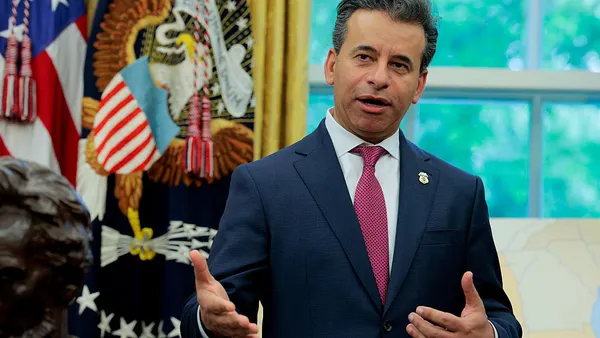Dive Brief:
- Amazon has received regulatory approval from about a dozen states to do business as a pharmacy wholesale distributor, according to review of public records by the St. Louis Dispatch.
- Nevada, Arizona, North Dakota, Louisiana, Alabama, New Jersey, Michigan, Connecticut, Idaho, New Hampshire, Oregon and Tennessee are among the states that have granted approval, and Maine is pending, according to the Dispatch’s report.
- In order to operate as a consumer prescription provider, Amazon would still need to obtain a pharmacy license, according to the report. A request for comment wasn't immediately returned, although Amazon previously declined to comment regarding its pharmacy plans, saying in an email, "We have a longstanding practice of not commenting on rumor and speculation."
Dive Insight:
Amazon's major foray into brick-and-mortar via its $13.7 billion takeover of grocer Whole Foods has led to speculation that it could make a similar play in pharmacy, and analysts at investment bank Leerink Partners earlier this month said that it’s only a matter of time.
Amazon already sells medical devices and employs executives to deal with health care-related regulatory issues, and it was previously said to be exploring how to ramp up its efforts in the pharmacy space. All of this has led Leerink analysts to indicate a certain inevitability that Amazon will enter the space within the next two years.
Yet retailers like Walgreens haven't been all that worried. In July, Walgreens CEO Stefano Pessina expressed doubts that the drugstore and its rivals would have to contend with Amazon's entry into the prescription market.
Sales of prescription drugs provide drugstore chains with a steady stream of customers, but it's a volatile space. Big-dollar corporate and government contracts are won and lost, generic versions of often-prescribed medicines can ding sales and the Affordable Care Act has brought some price pressures to the health care sector in general, bringing costs down for consumers but not necessarily for retailers.
Adding to the instability is the current political environment, where recent actions by Congress and the Trump administration are poised to disrupt the space further. The administration has already introduced uncertainty into the market with a series of votes and executive measures widely seen as undermining aspects of the health care law, including prescriptions.
It's not just Walgreens, Rite Aid or CVS that would be challenged by such a move; Amazon in the pharmacy space would also challenge Walmart, a major pharmacy player with the advantage of a huge physical store fleet and an increased willingness to go head-to-head with Amazon in e-commerce.















